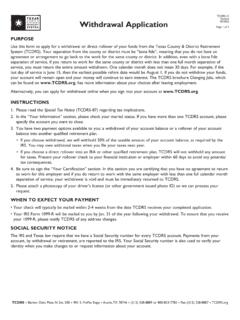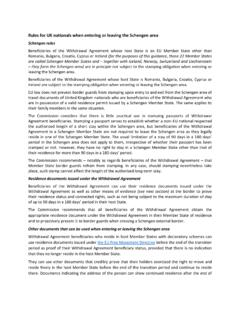Transcription of Explainer for part 2 (citizens' rights) of the agreement ...
1 1 Explainer for part two (citizens rights ) of the agreement on the withdrawal of the United Kingdom of Great Britain and Northern Ireland from the European Union 16 October 2020 2 Summary 1. The UK left the EU on 31 January 2020. The withdrawal agreement set the terms of the UK s departure, providing a smooth exit and orderly transition to the future relationship for people, businesses and organisations across our country. A transition period is now in effect and will end on 31 December 2020. 2. The Government has been clear that its priority is to provide certainty for EU citizens living in the UK, and UK nationals living in the EU.
2 Part Two of the withdrawal agreement gives people certainty that their citizens rights will be protected. People within scope of Part Two of the withdrawal agreement will have broadly the same entitlements to work, study and access public services and benefits as now, in as far as these entitlements have derived from UK membership of the EU. 3. The withdrawal agreement is without prejudice to Common Travel Area arrangements between the UK and Ireland and the rights of British and Irish citizens in each other s state. Irish citizens in the UK will not need to apply for settled status to protect their entitlements and UK nationals in Ireland will not need to register their 4.
3 This document is intended as a guide to support understanding of Part Two of the withdrawal agreement , which entered into force on 31 January 2020. Implementing Part Two of the withdrawal agreement 5. The withdrawal agreement required domestic legislation in order to be implemented in the UK. On 23 January 2020, Parliament passed the EU ( withdrawal agreement ) Act 2020, which gave effect to the withdrawal agreement in UK law. This Act is the primary vehicle for the implementation of Part Two of the withdrawal agreement in the UK. Further information on the legislation can be found on 6.
4 In the EU, the withdrawal agreement , as an international Treaty negotiated on behalf of the Member States, is legally binding on the Member States and the EU institutions. Individuals can rely directly on their rights under the withdrawal agreement in the same way as existing EU law. Eligibility and scope of Citizens rights 1 A Memorandum of Understanding was signed by the UK and Ireland in May 2019, reaffirming our ongoing commitment to the protection of the Common Travel Area and associated reciprocal rights and privileges. 3 7. Part Two of the withdrawal agreement provides that all UK nationals lawfully residing in a Member State at the end of the transition period will be able to stay in that host state,2 as will all EU citizens lawfully residing in the UK.
5 Their family members resident in the host state by 31 December 2020 will also be covered by the rights set out in the withdrawal agreement . 8. The conditions for lawful residence in the withdrawal agreement mirror those of current EU law on free movement, including the free movement Generally, individuals meet these conditions if they are in one of the following categories by the end of the transition period: a. are workers or self-employed; b. have sufficient resources and comprehensive sickness insurance, for example, a retired person or a student; c. are close family members of another person who meets these conditions; or d.
6 Have already acquired the right of permanent residence. 9. Individuals in scope of the withdrawal agreement can be joined by close family members (spouses, civil and unmarried partners, dependent children and grandchildren, and dependent parents and grandparents) who live in a different country at any point in the future, if the relationship existed on 31 December 2020 and still exists when the person wishes to join an EU citizen in the UK or a UK national in the EU. Such family members will then be protected by the withdrawal agreement . 10. Any child born to an individual in scope is also protected by the withdrawal agreement if the individual has custody of the child.
7 11. Generally, dual nationals of the UK and the EU, whether by birth or naturalisation, are covered by the withdrawal agreement if they have exercised free movement rights by the end of the transition period. Dual nationals who acquire nationality of their host state after the end of the transition period are also covered, if they exercised free movement rights by the end of that period. Dual nationals who have never exercised their free 2 The host state is the country in which an individual has taken up lawful residence. For example, if a UK national moved to live in Romania by the end of the transition period their host state would be Romania.
8 EU citizens host state would be the UK. 3 As a matter of UK domestic policy, EU citizens are not required to establish their lawful residence in order to qualify for status under the EU Settlement Scheme. 4 movement rights are not covered by the full scope of the withdrawal agreement . 12. The withdrawal agreement also protects those citizens who reside in one state and regularly work in another. These are known as frontier workers. rights related to residence 13. UK nationals who have been living in a Member State continuously and lawfully4 for five years at the end of the transition period will have the right to reside permanently in that Member State.
9 Equally, EU citizens who have been living in the UK continuously and lawfully for five years at the end of the transition period will have the right to reside permanently in the UK. To be considered continuously resident, individuals will generally have been lawfully residing in their host state for at least six months in any 12-month period. 14. Those who have not yet resided continuously and lawfully for five years in their host state by the end of the transition period will also be able to stay until they have reached the five year threshold, at which point they will qualify for the right to reside permanently.
10 Until this five year threshold has been met, continuity of residence in the host state will be broken by a period or periods of more than six months in total in any 12-month period. One absence lasting a maximum of 12 consecutive months for an important reason, such as pregnancy and childbirth, serious illness, study, vocational training or a posting abroad is permitted. The withdrawal agreement enables the host state to restrict these rights if the individual is a serious or persistent criminal, or if they seek to abuse or defraud the system. 15. The UK and Member States can choose whether to require EU citizens, UK nationals and their family members to apply for a new residence status or not.
















